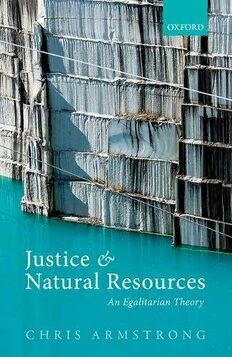
Justice and natural resources : an egalitarian theory PDF
Preview Justice and natural resources : an egalitarian theory
JUSTICE AND NATURAL RESOURCES Justice and Natural Resources An Egalitarian Theory CHRIS ARMSTRONG 1 3 GreatClarendonStreet,Oxford,OX26DP, UnitedKingdom OxfordUniversityPressisadepartmentoftheUniversityofOxford. ItfurtherstheUniversity’sobjectiveofexcellenceinresearch,scholarship, andeducationbypublishingworldwide.Oxfordisaregisteredtrademarkof OxfordUniversityPressintheUKandincertainothercountries ©ChrisArmstrong2017 Themoralrightsoftheauthorhavebeenasserted FirstEditionpublishedin2017 Impression:1 Allrightsreserved.Nopartofthispublicationmaybereproduced,storedin aretrievalsystem,ortransmitted,inanyformorbyanymeans,withoutthe priorpermissioninwritingofOxfordUniversityPress,orasexpresslypermitted bylaw,bylicenceorundertermsagreedwiththeappropriatereprographics rightsorganization.Enquiriesconcerningreproductionoutsidethescopeofthe aboveshouldbesenttotheRightsDepartment,OxfordUniversityPress,atthe addressabove Youmustnotcirculatethisworkinanyotherform andyoumustimposethissameconditiononanyacquirer PublishedintheUnitedStatesofAmericabyOxfordUniversityPress 198MadisonAvenue,NewYork,NY10016,UnitedStatesofAmerica BritishLibraryCataloguinginPublicationData Dataavailable LibraryofCongressControlNumber:2016960742 ISBN 978–0–19–870272–6 PrintedinGreatBritainby ClaysLtd,StIvesplc LinkstothirdpartywebsitesareprovidedbyOxfordingoodfaithand forinformationonly.Oxforddisclaimsanyresponsibilityforthematerials containedinanythirdpartywebsitereferencedinthiswork. Acknowledgements Ihavebeenworkingonthisbookforroughlyhalfadecade,andhaveracked up a number of debts along the way. A Mid-Career Fellowship from the British Academy during the academic year 2012–13 provided much-needed time to make progress on the manuscript. Visiting fellowships at the Centre for Democracy, Peace and Justice at the University of Uppsala, at the Centre fortheStudyofSocialJusticeattheUniversityofOxford,andintheSchoolof Philosophy in the Australian National University provided space away from thedistractionsofmyhomeuniversity.Ihavealsobenefitedgreatlyfromthe broadcommunityofpeoplenowworkingonegalitariantheory,globaljustice, territorialrights,andnaturalresources.Forcommentsonvariouschapters— and in some cases the whole manuscript—I would like to extend my sincere thanks to Ayelet Banai, Megan Blomfield, Gillian Brock, Alex Brown, Daniel Callies, Simon Caney, Ian Carter, Dimitris Efthymiou, Anca Gheaus, Bob Goodin, Clare Heyward, Holly Lawford-Smith, Duncan McLaren, Alejandra Mancilla,AndrewMason,DarrelMoellendorf,ShmulikNili,KieranOberman, David Owen, Ed Page, Fabian Schuppert, Henry Shue, Annie Stilz, Kit Wellman, Leif Wenar, Scott Wisor, and Lea Ypi. I would also like to thank audiencesattheUniversityofAmsterdam,theAustralianNationalUniversity, the University of Bristol, the University of the West of England in Bristol, UniversityCollegeDublin,theUniversityofDurham,HumboldtUniversityof Berlin,theLondonSchoolofEconomics,McGillUniversity,theUniversityof New South Wales, the University of Oslo, Nuffield College Oxford, the University of Salamanca, the University of Southampton, the University of Uppsala,theUniversityofUtrecht,theUniversityofVienna,theUniversityof Warwick,andtheUniversityofZurich.Iwouldliketoextendspecialthanksto thosewhoparticipatedinasymposiumonmybook-in-progressattheGoethe University Frankfurt during January 2016, including Darrel Moellendorf, Merten Reglitz, Daniel Callies, Eszter Kollar, Anca Gheaus, and Ayelet Banai. All of these interlocutors have helped me to sharpen the arguments presented here, though I am aware that many of them continue to disagree withsome,andsometimesmuch,ofwhatIhavetosay. Chapter3drawsonmypaper‘NaturalResources:TheDemandsofEqual- ity’, Journal of Social Philosophy 44/4 (2013): 331–47. Chapter5 draws on ‘JusticeandAttachmenttoNaturalResources’,JournalofPoliticalPhilosophy 14/2 (2014): 48–65. Chapter6 draws on ‘Against “Permanent Sovereignty” vi Acknowledgements over Natural Resources’, Politics, Philosophy and Economics 14/2 (2015): 129–51.Ineachcasethetexthasbeenrevisedsubstantially. Finally, I would like to dedicate this book to those who have given me so much support while I wrote it: for Sophia, Felix, Leonard, and Yasmin, withlove. Contents Introduction 1 1. ResourcesandRights 9 2. EqualityandItsCritics 29 3. TheDemandsofEquality 62 4. RewardingImprovement 93 5. AccommodatingAttachment 113 6. AgainstPermanentSovereignty 132 7. PerfectingSovereignty? 150 8. ResourceTaxes 177 9. TheOcean’sRiches 201 10. TheBurdensofConservation 220 References 248 Index 262 Introduction Conflicts over natural resources are impossible to ignore in our world. We knowthatthetribespeopleoftheAmazonhavebeenbrutallydispossessedas great swathes of rainforest are destroyed. Weunderstand that a key factor in many of the civil wars which have devastated African communities is the struggletogaincontroloversuppliesofoil,diamonds,andgold.Wemayeven remember that a relentless thirst for natural resources spurred Europe’s colonization of the world, shaping the very boundaries of nation-states in its aftermath.Countries suchas Argentina,the IvoryCoast, andtheGold Coast (now Ghana) were even named after the resources to be found (or pillaged) there. Others (including Nigeria, Cameroon, Senegal, and Gambia) were namedfortheriverswhichsustainedlocalcommunities. Asresourcesareconsumedevermorefrenetically,strugglesoverthemshow no sign of disappearing. The desire to exert control over as yet untapped naturalresourceshasmotivatednewterritorialclaimsovertheArcticregion, andseenmillionspouredintodeep-seaminingtechnology.Politicalscientists haveoftenpredictedthat‘waterwars’willbeafeatureofourfuture,although thankfully those predictions have not yet been borne out.1 We know that many economies in the Middle East have been transformed by the discovery ofoil,andbytheconflictswhichhavesometimesfollowed.Buttheseconflicts arenotconfinedtogeographical‘hotspots’.Ratherdisagreementsaboutwho owns resources, and how they should be used, are endemic. In the Scottish independencecampaignof2014,debatesabouttheviabilityofaScottishstate frequentlyturnedonrivalclaimsaboutwhowouldendupowningNorthSea oil,andevenwhatpriceitmightbeexpectedtocommandinthecomingyears. AsIwrite,manyCanadiancitizensarecampaigningtoraiseawarenessofthe environmental impact of oil pipelines, and tar sands exploitation, on virgin forestsandontheindigenouspeoplewholiveinthem. Itisabundantlyclearthatnaturalresourcesmattertopeople.Allofusneed some resources if we are to survive—including water, air, light from the sun, andsomelandtostandupon.Othersaresovaluablethatstateswhichpossess large reserves of them have a guaranteed source of income (though whether that income will be turned into sustained economic growth, or shared with
